
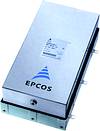
Film capacitors rank among the most versatile electronic components. Epcos' Components Magazine interviewed António Marsiglia, President of the Epcos Film Capacitors Division, and Executive Vice President Joachim Zichlarz, who outlined the company's road map for these electronic all-rounders.

Epcos has just started making film capacitors in Zhuhai, China. What are you planning next?
The Film Capacitors Division has been pursuing a dynamic growth strategy for some time and grown significantly faster than the market in recent years. Producing components as near as possible to where our customers need them is a key aspect of this strategy, especially in greater China, where we face many local competitors. So setting up a local manufacturing facility was an obvious way of boosting Epcos' long-term visibility as an attractive and competitive partner to customers in China, Hong Kong and Taiwan. Film capacitor production in Zhuhai, where ceramic components have been made for some time, is starting with SilverCaps and polypropylene capacitors for lighting and entertainment electronics. X2 capacitors will come next, followed by AC capacitors. These components will be used in domestic appliances, air conditioning and ballasts for fluorescent lamps.
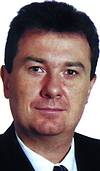
Where does Epcos make film capacitors today?
In film capacitors, we distinguish between DC capacitors, many of which are commodities made by the million, and power capacitors for industrial electronics and power factor correction. We have been manufacturing these two categories in Brazil, Spain, Germany, Hungary, India and, most recently, in China. But this will change as we take advantage of synergies and optimise production at all our plants. In Europe, film capacitors will be made at only one location in two years' time instead of three today.
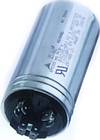
What are typical applications for film capacitors?
DC capacitors cover a wide variety of applications. Epcos has an outstanding position in the world market, especially in stacked film capacitors of all sizes. Extremely compact and economical in design, these components can safely handle high pulse loads in particular. SilverCaps can be quickly and easily adapted in size, even to extreme customer requirements. They are typically used in ignition equipment for gas and oil furnaces and for two-stroke gasoline engines, in ignition circuits for the xenon lamps of car headlights and video projectors, in energy-saving lamps, for energy storage and voltage stabilisation in ballasts and switch-mode power supplies, in interference suppression filters - especially in cars - and for DC decoupling. Capacitors with conventional wound films are used in deflection circuits for TV picture tubes and computer monitors, switch-mode power supplies, electronic ballasts, voltage converters, telecom applications such as line cards and xDSL modules, and many other applications. Film capacitors are ideal for radio interference suppression in all kinds of equipment.
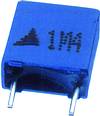
What is the situation like for power capacitors? What are the key applications?
Under the trade name PCC LP (power capacitor chip, low-power), we have launched a new product line with a technology unique to Epcos. Delivering 100 to 6000 µF, these components are targeted not only at automotive electronics, but also at industrial electronics and rail traction in the range up to 1000 V d.c., eg as link circuit capacitors for IGBT converters, auxiliary drive converters, integrated starter generators and hybrid vehicles. MKK (metallised plastic film) DC capacitors with flat windings in stainless steel cases and the new PCC HP (power capacitor chip, high-power) line developed by Epcos are used as filters and supporting capacitors in high-power frequency converters for industrial electronics and rail traction. Further applications include energy storage for uninterruptible power supplies and impulse discharge equipment. The most important application for capacitors with tubular windings in aluminum cans is power factor correction (PFC), which is covered by our PhaseCap, PhiCap and WindCap brands. These capacitors can also be used in AC input and output filters. So there is virtually no application in electrical engineering or electronics that can do without film capacitors from Epcos.
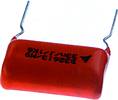
What are the advantages of film capacitors over ceramic or aluminium electrolytic capacitors?
Film capacitors offer the advantage of self-healing when electrically overloaded. They have a built-in fail-safe mechanism: when the dielectric breaks down, they form an open circuit instead of shorting. Film capacitors are substantially more reliable and last longer than aluminium electrolytic or ceramic capacitors under difficult operating conditions such as high temperature. In comparison with aluminium electrolytics in particular, their service life is much longer. But the low dielectric constant of plastic film means that volumetric capacitance is relatively low. In power capacitors, you should compare our dry, ie oil-free types with the older, oil-impregnated capacitors with metallised paper. The benefits of dry technology, to which Epcos attaches great importance, are reduced volume, lower weight, improved safety, and lower cost.
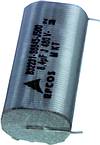
Film capacitors tend to be regarded as fully developed products. What innovations and improvements does Epcos have to offer? What are the trends in film capacitor technology?
Trends in film capacitors reflect the tougher requirements of lighting and automotive applications in particular: higher temperature stability, resistance to ambient influences such as vibration and moisture, and other factors. We are steadily widening the scope of application by using high-temperature dielectrics and optimising all materials and production processes. There is also a sustained trend toward miniaturisation, as a result of which metallisation layers are being optimised and film thicknesses reduced. Power electronics is moving toward higher outputs and more compact dimensions. The new PCCs meet these requirements with terminal configurations of particularly low inductance, which benefits IGBT converter applications. Current-handling capability, permissible field strength under operating conditions, and volumetric capacitance are to be increased further. Here development focuses on improvement of preliminary process steps, such as production and metallisation of polymer film, in cooperation with our suppliers. Standard metallisation is giving way to metallisation optimised for each application, so the performance data of metallised plastic film technology will keep improving. Film capacitors with thinner and thinner polymer films will move beyond traction and industrial electronics into more and more applications previously reserved for aluminium electrolytic capacitors - and even open up new ones.
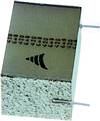
Epcos serves the telecom, automotive, industrial and consumer electronics markets. What sales results did the Film Capacitors Division score here in the past fiscal year?
Industrial electronics continues to account for the largest share - about 40% - of film capacitor sales. This segment does, of course, cover a very wide range of applications, from high-speed trains through switchgear to lighting. The second-largest market is consumer electronics, which makes up some 20% of sales, followed by automotive electronics with 15% and telecommunications with about 10%. Distributors account for the remaining 15%.
Will this pattern change in the near future?
In sales by industries, automotive and telecom applications will certainly claim larger shares. We do not expect unduly high growth rates in consumer electronics, but new telecom applications such as xDSL for high-speed Internet access will boost demand for film capacitors. The same is true of the automobile industry as the electronics content of cars keeps rising. New concepts such as 42 V automotive electrical networks, more and more electronic controls for engine management, and the growing popularity of high-intensity gas discharge lamps in headlights are just a few examples of the many innovative applications of automotive film capacitors.
What market segments and applications offer the greatest prospects for growth?
The most dynamic segments are automotive electronics and telecommunications. To keep up with innovative trends and offer optimised components for emerging applications, we have set up special design teams in automotive electronics, for example, that work closely with customers to speed up developments. Our numerous design wins include metallised polyester film capacitors for common-rail diesel injection, which are by far the market leader. Similarly, we are working with automobile manufacturers on new designs scheduled to enter production in 2004. But in contrast with automotive film capacitors or power capacitors for rail traction, time to market is very short for most other applications. As market windows narrow, the time elapsing between development and volume production is often the key selling proposition for a customer-specific component.
| Tel: | +27 11 458 9000 |
| Email: | [email protected] |
| www: | www.electrocomp.co.za |
| Articles: | More information and articles about Electrocomp |

© Technews Publishing (Pty) Ltd | All Rights Reserved